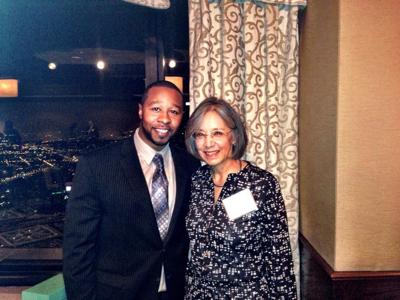Ten years after the Wisconsin Innocence Project proved Jarrett Adams innocent, he will be back in a Wisconsin court — this time as an attorney to prove another person’s longstanding innocence claim.
“What I’m doing is this: I’m making sure that voices are heard and people are sympathetic to the reality of what the criminal justice system is,” Adams said.
The WIP was co-founded in 1998 by UW-Madison professors Keith Findley and John Pray. Since its inception, the organization has freed 24 wrongfully convicted individuals, including Adams.
Adams was arrested in 1998 when he was 17 years old after he and two others were accused of rape following a party on a college campus.
He was convicted to 28 years in a maximum security prison. Adams recalls his cellmate encouraging him to pursue proving his own innocence.
“You learn the law and you study and you work hard,” Adams remembers him saying. “It is better to die fighting than to die lying down,” the cellmate said.
While in prison, Adams began studying the law and filing appeals. He eventually worked alongside the WIP staff in the case that led to his freedom.
Dimitri Henley, another friend at the party, was also convicted using the same evidence in Adams’ case. Findley said the WIP picked up his file before Adams, but Henley’s case had reached a strict one-year statute of limitations to file a petition.
“We couldn’t do anything,” Findley said.
Henley was released from prison but with a conviction on his record and registered as a sex offender.
“It’s an uplifting story of redemption and justice served, but at the same, there’s a parallel story of the injustice,” Findley said of Adams case. “That is particularly clear in the case of Dimitri Henley.”
Following his exoneration, Adams attended college and graduated from Loyola University Chicago School of Law in May 2015 with a juris doctorate. He now works at the Innocence Project, which is affiliated with the Cardozo Law School in New York.
“An organization like the Innocence Project, they are the ones who advocate on behalf of a fair outcome, on behalf of fair justice,” Adams said.
Adams began his law career as a public interest law fellow with Ann Claire Williams, a judge for the Seventh Circuit U.S. Court of Appeals — the same court that reversed Jarrett’s conviction.
He and Findley, who represented Adams in his exoneration case, will appear in court Tuesday representing Richard Beranek. Beranek is seeking postconviction relief from a sexual assault conviction based on DNA results that they argue prove his innocence.
Beranek was convicted with evidence from a two-year-old eyewitness identification and the testimony of a FBI hair analyst, which the FBI now admits “exceeded the limits of science.” New DNA testing has now proven that hair collected from underwear left at the scene that was previously linked with Beranek is not his.
“It’s really powerful evidence of innocence, and frankly, I am baffled why the state is even resisting,” Findley said.
Beranek’s postconviction hearing is scheduled for Tuesday at 8:30 a.m. in Dane County Circuit Court.



